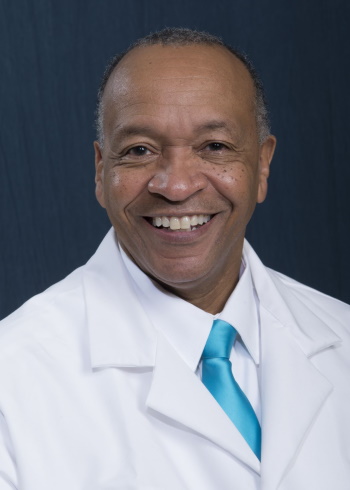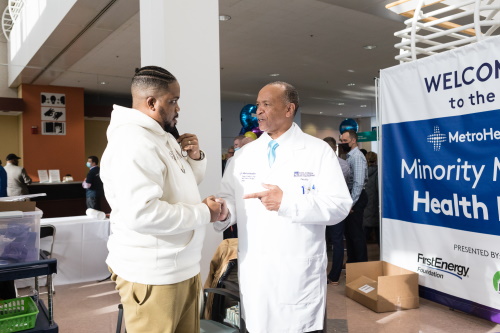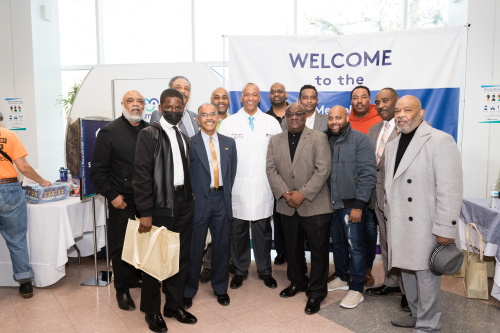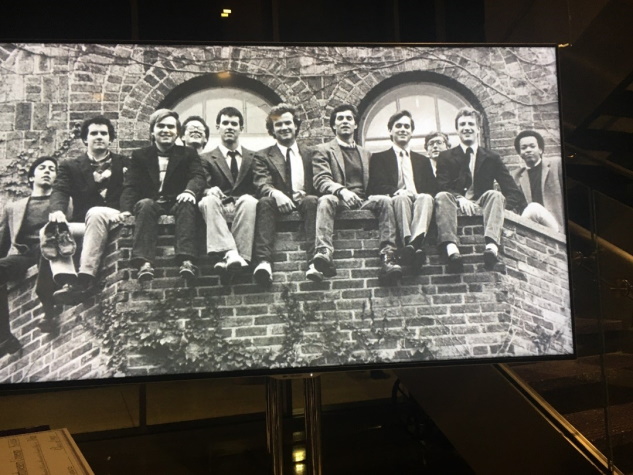Features
 In a world striving to be more inclusive, Dr. Charles Modlin (Northwestern) wants to ensure healthcare providers are not blind to how color impacts the quality of healthcare a patient receives.
In a world striving to be more inclusive, Dr. Charles Modlin (Northwestern) wants to ensure healthcare providers are not blind to how color impacts the quality of healthcare a patient receives.
As one of only a few African American surgeons in the country specializing in kidney transplants and a board-certified urologist, Dr. Modlin is intently focused on equity for his patients. He believes all patients, regardless of individual traits or backgrounds, deserve the same healthcare access and opportunities for successful outcomes.
“Health equity is a national conversation that few people are talking about,” said Dr. Modlin, who founded the Minority Men’s Health Clinic in 2003 while on staff at Cleveland Clinic in Ohio. “And it’s a crisis that predominately afflicts the minority members of our population.”
Currently the vice president and chief health equity officer at MetroHealth (Cleveland), Dr. Modlin continues his work to address disparities in healthcare – becoming a powerful voice in the medical world advocating for action.
Over a career spanning four decades, Dr. Modlin has championed equity in the healthcare community. That goal has become embedded in nearly every aspect of his life.
He recently launched a nationwide initiative to raise awareness about healthcare equity in the minority population, which suffers disproportionately from chronic diseases, including prostate cancer, cardiovascular disease, hypertension, and diabetes.
“We have to be better at finding ways to solve healthcare disparities across the board,” urges Dr. Modlin, who has served as chair for health committees for the Cleveland NAACP and the 100 Black Men of Greater Cleveland. “
He estimates in 20 years, those with health disparities will be the majority percentage of the population – significantly disrupting the economy and labor force - unless action from the healthcare community and stakeholders from all sectors of society is taken today.

An Early Interest in Service to Others
Dr. Modlin was born and raised in New Castle, Indiana, a small town northeast of Indianapolis. There, his maternal ancestors farmed several hundred acres of generational farmland before it was foreclosed. His father was a WWII Navy veteran and factory worker; his mother was an elementary school teacher – and a trailblazer. Grace Modlin was the first African American teacher in the history of Henry County.
In a family of role models with strong work ethic, and where the bar for success was high, Dr. Modlin excelled. At the top of his class academically, he was drawn to the structure of science and math. But music was his first love, and he envisioned a life on stage playing the trumpet.
That interest changed when his grandmother moved into his home, and Dr. Modlin watched the care his mother provided. When his grandmother moved into a nursing home, he often stopped by to visit, soon realizing he enjoyed being of service to others.
Later, as he considered life after high school, he was at the crossroads of music and medicine. His music teacher broke the tie.
“My trumpet teacher said I could pursue music as a hobby, but make a better living for myself in medicine,” said Dr. Modlin, laughing at an early lesson in economic reality.
Today, he’s found a way to fulfill both passions – a career as a surgeon and trumpeter with the Shaker Heights Community Band in Cleveland.
Breaking Barriers Along the Way
Dr. Modlin entered the Feinberg School of Medicine at Northwestern University in 1983 after earning his bachelor’s in chemistry at Northwestern. In med school, he stood out for his academic acumen and as the only Black male student in his class.
At the time, African American students comprised less than six percent of medical students (today, that figure is only 12 percent). Dr. Modlin defied the odds for medical school, and also “advice” from his high school counselor during his senior year.
Upon learning he wanted to become a physician, his counselor laughed and said, “you’re not med school material.”
Among the top of his class in literally every measure of high school achievement, Dr. Modlin was shocked, but not deterred by the comment.
“There were always going to be challenges,” he noted. “I learned to face them and move forward.”
He leaned on advice from his father, Charles Modlin, Sr., who passed his life lessons onto his only son.
“My dad told me in order to overcome an obstacle, you have to get to the point where you hate it,” said Dr. Modlin, the father of four children with his wife, Sheryl, also a physician. “Never hate the person, but hate the situation.”
Decades later when Dr. Modlin returned to New Castle to be honored as a distinguished alumnus, his former counselor – now in her 80’s and retired – was sitting in the front row.
“I took the high road and thanked ‘everyone’, including her, who motivated me along the way,” he said.
Closing the Divide that Limits Care
The gap in healthcare access was a topic Dr. Modlin learned primarily on his own.
“I don’t remember during my 17 years of medical training [post high school] any mention of healthcare disparities,” he said.
After finishing his formal medical training, he learned of the Healthy People 2000 Initiative, established in 1990 by the federal government, with the goal of eradicating healthcare disparities over the next decade.
“I started educating myself about the initiative, and the more I learned about the disparities - primarily within minority populations - the angrier I became,” said Dr. Modlin.
He was spurred by two things his father always told him as a young boy that stayed with him as he became an adult and doctor.
“He said, ‘nobody cares about black men’ and ‘it was my responsibility to use my education to give back to the community’,” Dr. Modlin said. “I didn’t fully understand what he was talking about then because I needed lived experiences…but I understand now.”
In 2003, after a family visit to the National Underground Freedom Center in Cincinnati, Dr. Modlin came away angry and re-focused. The stories, pictures, and exhibits brought the tragic history of slavery to stark reality before his eyes, and he knew he needed to take action.
Experiments and other “egregious actions” by doctors and hospitals performed decades ago created an apprehension of the healthcare community over generations of African Americans.
His father’s words came to him, along with an “epiphany” of how he could use his skills to diminish the distrust.

Putting His Vision into Action
Back home at Cleveland Clinic, Dr. Modlin launched the African American Health Initiative. In 2003, the Annual Minority Men’s Health Fair opened, followed by the Minority Men’s Health Center. The annual fair has grown from a few dozen men in the first year to several thousand in recent years.
One Cleveland resident, Waverly Willis, said he owes his life to Dr. Modlin and the Health Fair. Following a visit to the fair in 2013, a health screening detected traces of blood in his urine that routine physicals had missed. He was diagnosed with kidney cancer a few days later.
“Two weeks later, I was in the hospital having my kidney removed,” said Willis, who owns barber shops in Cleveland--along with a clean bill of health. His story is one of many that have emerged from the health fair.
The impact of the Health Fair initiative is nationwide, with healthcare systems across the country looking to replicate this model of healthcare.
Focusing care on underserved populations also helps healthcare providers recognize their own implicit biases – himself included.
Dr. Modlin recalls a woman who came to his office dressed in a way that may have prompted other doctors to dismiss her concerns. He admits having an initial assumption…before learning she was a nurse.
“If I hadn’t taken the time to get to know her better, ask questions, I never would have known,” said Dr. Modlin, noting he is proud of his reputation as someone who listens and spends more time with patients.
Connecting and Reconnecting with Sigma Nu
Joining a fraternity was not on the radar for Dr. Modlin when he arrived at Northwestern in 1981. He was focused on grades and getting into medical school. Social events were a low priority.
But he often walked by the Sigma Nu house on Sheridan Road, which stood out for its architectural beauty along fraternity row. During pledge week his junior year, he stopped in – simply to see the interior of the home he admired.
“Everybody was so welcoming and weren’t trying to rush me…just get to know me,” said Dr. Modlin. “And I felt a bond with the men in Sigma Nu.”
The Gamma Beta Chapter also had the highest grade point average nationally, which sealed the deal.
“Sigma Nu was different than the other fraternities,” Dr. Modlin said. “They were serious about their academics.”
Although his busy life has led to sporadic contact with the Fraternity since college, he sees real opportunities to reconnect. His mission of bringing national awareness to the crisis of healthcare disparities could be amplified through the network of Sigma Nu chapters.
“Sigma Nu has always been about serving the community,” Dr. Modlin said. “I think they would be a good catalyst for helping me spread the word about the health inequities and service to the community.”
